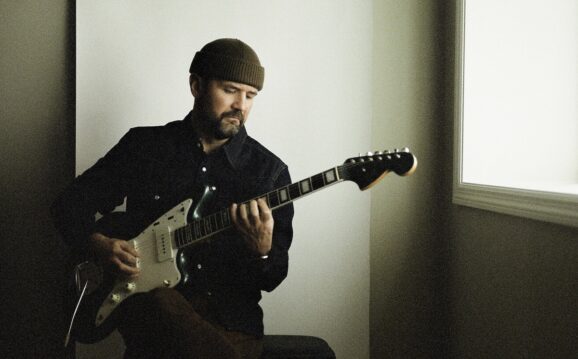[rating=7.00]
 Death-its’ finality or the omnipresent spell it casts over our day-to-day existence-features as a thematic center point for Okkervil River’s latest album, Away. Over the course of the past several years following the band’s last release, the nostalgia-tinged The Silver Gymnasium, frontman Will Sheff went through a self-proclaimed “confusing time of transition”. A few band members left, causing Sheff to doubt whether or not Okkervil River would even continue forth as an entity. His tumultuous relationship with the music industry deepened as he engaged in a bit of public sniping with Don Henley over Sheff’s interpretation of a Henley Top-40 hit. And, most devastatingly personal, Sheff mourned the death of his beloved grandfather, who passed away after a lengthy stay in hospice, where Sheff would be a frequent companion by his side.
Death-its’ finality or the omnipresent spell it casts over our day-to-day existence-features as a thematic center point for Okkervil River’s latest album, Away. Over the course of the past several years following the band’s last release, the nostalgia-tinged The Silver Gymnasium, frontman Will Sheff went through a self-proclaimed “confusing time of transition”. A few band members left, causing Sheff to doubt whether or not Okkervil River would even continue forth as an entity. His tumultuous relationship with the music industry deepened as he engaged in a bit of public sniping with Don Henley over Sheff’s interpretation of a Henley Top-40 hit. And, most devastatingly personal, Sheff mourned the death of his beloved grandfather, who passed away after a lengthy stay in hospice, where Sheff would be a frequent companion by his side.
To process these varying emotions, Sheff decamped to a friend’s house in a remote area of the Catskills and wrote. However, rather than focusing or dwelling on the past, he concentrated on the present; what was on his mind at the time seemed to be the main criteria for the songwriting process. What results is a plethora of ideas and narratives that gel around the concept of both finite and metaphorical endings. He may have attempted to excise his history from the process, but it seems as though it was a little more difficult to outrun than he may have envisioned it being.
In the album’s opening track, the aptly titled “Okkervil River, R.I.P.”, Sheff uses his band’s reshuffling as an impetus to examine the changing dynamics of life, referencing past regrets, indiscretions, and several famous musician deaths along the way. Next, on “Call Yourself Renee”, the narrator examines life as a series of fleeting, often mundane moments: happiness can be found in routine moments of the ordinary: fast food dining and clothes shopping being chief sources of inspiration. With a few exceptions, Sheff sees life from Everyman terms. The typical person may not life the life of legend, but that doesn’t necessarily make it any less meaningful or heroic.
Elsewhere, Sheff continues to write from an honest and vulnerable space, chewing over the mysteries of our being, but never choosing any route with certainty. At times, he appears contemplative- in an exception to his focus on the ordinary, he elegantly envisions his grandfather’s World War II battleship appearing to carry the dying man home in “Comes Indiana Through The Smoke”-and assures those listening that his beloved would eventually find him in the afterlife on “She Would Look For Me”. Other times, he is a bit vengeful, brooding over his inability to change the circumstances on “Judey On A Street” and damning past sins and transgressions on the rollicking “Frontman in Heaven”.
Musically, Away reflects the downbeat lyrical content. While beautifully tinged with acoustic finger-picked guitars, chamber flourishes, and sweetly skewed horn sections, most songs flow along slowly and quietly. They take their time presenting themselves, often building up through several verses worth of story before ending in grand spectacle and catharsis. It’s not an easy listen nor is it a casual one. The listening environment is important and it’s perhaps best consumed on an early Sunday morning with coffee or late weekday evening with a nightcap. Time is needed to focus on the sentiment and absorbing the songs in a clear space with minimal distractions help bring Sheff’s meditations to the surface. Like a good visual artist, he presents a detailed landscape that changes perspective with repeated views. As he cuts few corners in the material’s creation, it’s equally important to reciprocate and not shortchange the listening process.









